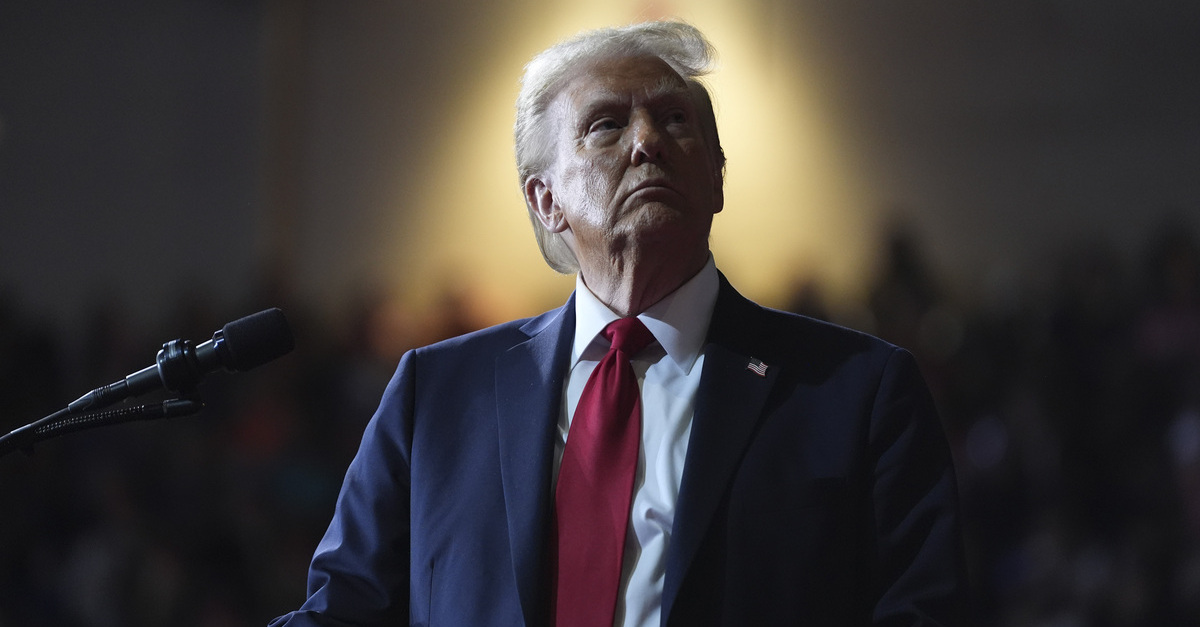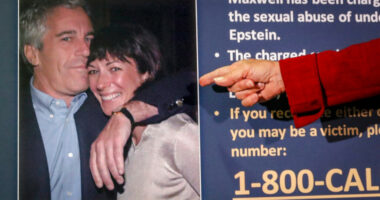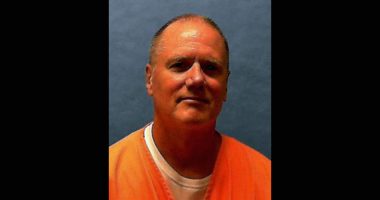
FILE — Republican presidential nominee former President Donald Trump watches a video screen at a campaign rally at the Salem Civic Center, in Salem, Va, Nov. 2, 2024 (AP Photo/Evan Vucci, File).
A federal judge grilled one of President Donald Trump‘s Justice Department lawyers on Monday about whether administration officials blatantly ignored a court order he issued blocking the deportations of migrants to El Salvador — asking him, “You felt you could disregard it?” — after the lawyer claimed the White House didn’t have to follow the judge’s court directive because it was given orally.
And that was just the start of it.
“I memorialize it in shorthand, but you’re telling me that that very clear point, you’re saying that you felt you could disregard it? Because it wasn’t in the written order?” asked U.S. District Judge James E. Boasberg.
Deputy Associate Attorney General Abhishek Kambli claimed that the Trump administration believes “there was no order given” because the written order is what controls things and an oral order from the bench is not enforceable. “So your first point is, ‘We didn’t have to obey your oral ruling,”” Boasberg said.
The Trump administration has been accused of willfully flouting the court’s Saturday order enjoining the government from removing more than 100 individuals from the country as it’s being sued for unlawfully doing so. Kambli admitted Monday that the administration did not comply with Boasberg’s oral order that he issued during a Saturday hearing, during which he instructed the DOJ to return the immigrants to the United States. That order, however, was not included in the written order he issued shortly after the hearing ended Saturday evening.
The Trump administration has asserted that it fully complied with the court’s written order and has even implored the U.S. Court of Appeals for the District of Columbia Circuit to remove Boasberg from the case for making DOJ lawyers defend the administration’s actions in an “open, public hearing.”
On Monday, Kambli repeatedly refused to answer questions about what went down with the deportations, citing “national security concerns” that prevented him from providing information about what happened — but admitting that he had no idea why.
“Those are operational issues, and I am not at liberty to provide — or authorized to provide — any information on how many planes left,” Kambli said. “The information that I am authorized to provide is that no planes took off from the United States after the written order came through, and the other information that I can relay is that the two planes that the plaintiffs cite in their filing, the timing of whether it was during the verbal order or the written order does not have any material bearing based on the timeline that they’ve given.”
More from Law&Crime: ‘Irreparable injuries flowing’: Judge slams Trump DOJ for refusing to ‘make any further effort to get at the truth’ in probationary firings case, denies motion for stay
Kambli added, “That is the only information that I’m authorized to give based on national security concerns, diplomatic concerns, and that is all I can provide.”
Boasberg was stunned, even laughing when asking Kambli about the reasons behind the secrecy.
“So you’re saying you can’t mention them publicly?” the judge asked.
Kambli replied, “I cannot mention them in a public setting. … The only information that I am authorized to disclose” — to which Boasberg interrupted and said, “Disclose to whom? To anybody? Including me?”
Kambli replied, “Yes, your honor. At this time.”
Boasberg asked for the DOJ’s reasons for keeping him in the dark, and Kambli repeated that it was due to “national security concerns, flight patterns and things of that sort.” Boasberg tried debriefing Kambli multiple times as to why, and each time, the lawyer claimed he didn’t have any information on the reasoning; Kambli said he was only told that the information could not be shared for the aforementioned reasons.
“Why are you showing up today and not having answers on why you can’t even disclose it … to me?” Boasberg asked sternly. “That’s the purpose of the hearing so we can find out answers. … Maybe those answers are classified, maybe they aren’t … but you can’t even tell me which of those applies?”
Kambli replied, “Your honor, all I can say is that I’m authorized to say what we said in (past) public filings. … We do believe that we complied with the court order, which is that no flights took off from U.S. territories after the second order.”
Laughing, Boasberg said: “That does not apply to my order.”
The entire controversy stems from a Saturday morning lawsuit filed by the ACLU on behalf of several pseudonymous Venezuelan men seeking to bar President Donald Trump from going through with his stated plan to deport the men using the obscure measure. In quick fashion, Boasberg granted the plaintiffs’ request, barring the government from invoking the AEA to remove individuals for 14 days and holding a Saturday evening hearing on the matter.
More from Law&Crime: ‘Unconstitutionally silenced’: Trump violating First and Fifth Amendments by deporting protesters and ‘impermissibly restricting speech’ based on critical viewpoints, suit says
During the hearing, DOJ attorneys told the court that two planes had already departed carrying individuals to Honduras and El Salvador. Boasberg at about 6:45 p.m. on Saturday issued an oral order that “unambiguously directed the government to turn around any planes carrying individuals being removed pursuant to the AEA Proclamation,” plaintiffs wrote in Monday’s filing.
Boasberg’s brief written order, which was issued at about 7:25 p.m. on Saturday, did not include the same directive ordering the planes to return to the country. Nonetheless, the administration allegedly allowed the planes to land and the individuals were handed over to the custody of other nations.
“This is a fast-moving case where there’s a lot of operational, national security and foreign relations (info) at risk,” Kambli said Monday, noting how the Trump administration believed it was following proper protocols “especially when the Court has said that it will issue a minute order memorializing this.”
Boasberg responded by ordering the DOJ to provide sworn declarations explaining exactly what happened over the weekend, the time frame and the reason for not being able to disclose information publicly or to him.
“I will memorialize it in a written order since apparently my verbal orders don’t seem to carry much weight,” he quipped before ending Monday’s hearing.
Jerry Lambe contributed to this report.








